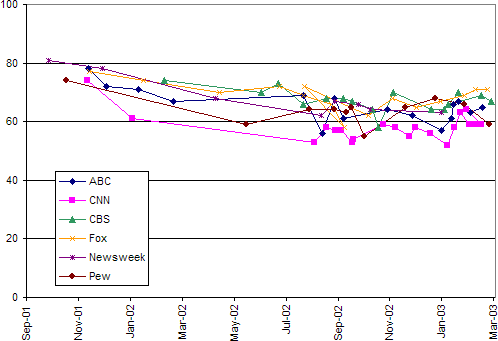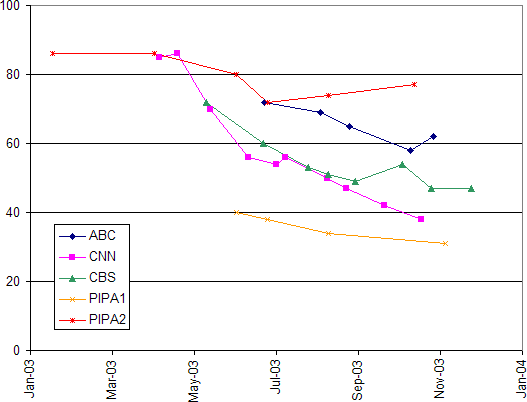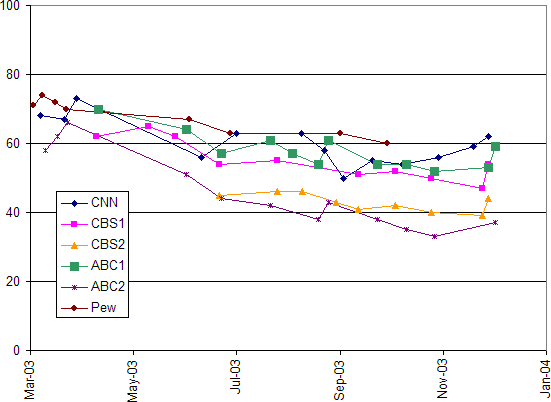|
Stardate
20040104.1840 (On Screen): Al writes:
I had doubted my country's citizen's resolve to defend ourselves until shortly after 9/11. After 30 years of "appeasement", I was afraid that we had become too soft to undertake any sort of national sacrifice. Even Mr. Reagan didn't unleash our forces after our 243 Marines were killed in Lebanon. Our military forces were not allowed to be have their weapons locked and loaded even after that attack. But post 9/11 has shown that you are most assuredly correct that too many Americans are Jacksonian in nature to allow this defenselessness appearance to continue indefinitely.
I was in the military in the 60's and 70's and I now work for an international construction company where I see the resolve to defend our country expressed by those I work with daily. However, I have been worried, based on my conversions with local leaders and national press reports, that in particular too many of our politicians and "elites" did and still do not have the political will necessary to lead our citizenry in defense of our American culture. The organized Left's stifling of support for any forceful response by America at each phase of the now War on Terror seemed to be very effective. Thank God President Bush didn't bow to the antiwar and anti-western crowd, which, as pronounced by our major media, was about to topple PM Blair and force President Bush to back down from his prosecution of the war. Too many of our present political and public personalities seem to be more fluff than substance and more concerned with what others think than what is good for Americans.
For thirty years we've been told that patriotism was shameful. We were told it was a demonstration of mental retardation or of ignorance about the world. People who were patriotic were heartless racists. For thirty years we've been pelted with the message that there was nothing about America that justified any pride.
And for thirty years the majority of Americans have ignored that message. It bounced off them like raindrops on a duck's back. Americans treasure their freedom of expression, and they treasure even more their freedom to ignore what other people say.
We've always had our critics. One of the reasons we seemed uninterested in examining "why they hate us" is that there have always been people who have hated us. But that hatred usually spoke more about them than it did about us.
The American Enterprise Institute for Public Policy Research has collated the results of every major opinion poll conducted in the US about foreign policy issues since the war began. It can be found here as a nifty 188-page 1.1 megabyte PDF file.
The most remarkable thing about it is not just how strong support has always been for the war, but how consistent it's been. In the period between the end of active combat in Afghanistan and the invasion of Iraq, there was a remarkably intense effort to try to influence American opinion by domestic opponents of war, by "allies", by other national governments, and by "non-aligned" international organizations, not to mention by more than a few "non-biased" news channels. And it made essentially no difference. Basic support for invasion of Iraq didn't waver:

This is a plot of 6 major polls on that question as listed on pages 24-31. And now you know why the anti-war message became increasingly emphatic and shrill during that period: they were failing, and they knew it, and they became frustrated and panicky.
They tried to deliver the same basic message in different packages. They altered their arguments, and they altered their means of delivery. They turned up the volume. And nothing seemed to work.
It's hardly surprising they got frustrated. For all the rhetoric about how decisions for war needed to be "multilateral", or that the UN needed to bless it, everyone always knew this truth: The decision would not be made in Europe. It would not be made in the UN. Indeed, it would not even be made in Washington. It would be made by the American people, and if the people of the US supported war in Iraq, there would be a war. If they did not, there would not be one.
And those opposing war have only gotten more frustrated since then, because support still isn't wavering. But you can ask the question in subtly different ways and get rather radical differences in results, as is shown starting on page 47:

So what's going on here? The answer depended on the question.
The ABC question was, Do you think the US should keep its military forces in Iraq until civil order is restored there, even if it means continued US military casualties, or do you think the US should withdraw its military forces from Iraq in order to avoid further US military casualties, even if that means civil order is not restored there?
CNN, on the other hand, asked How would you say things are going for the US in Iraq now that the major fighting has ended? Very well, moderately well, moderately badly or very badly? I have plotted the sum of the first two answers.
The CBS question was phrased similarly to the CNN question: How would you say things are going for the US in its efforts to bring stability and order to Iraq? Would you say things are going very well, somewhat well, somewhat badly, or very badly? Again, I have plotted the sum of the first two answers.
The two PIPA questions show this especially starkly. PIPA1 was How do you think the process of rebuilding Iraq is going? Very well, somewhat well, not very well, or not at all well? As with the other 4-way questions, I summed the first two responses.
But PIPA2 was Now that Saddam Hussein's government is toppled, do you think that the US does or does not have the responsibility to remain in Iraq as long as necessary until there is a stable government? And on that question, the answer "does" never dropped below 72%.
Since last May, there's been a huge effort to portray the occupation as a failure, a quagmire, as making no progress but costing huge numbers of American lives, and so on. Bloggers who support the war have long noticed the bias in reporting out of Iraq, with heavy emphasis on insurgent activity and Iraqi protests against the occupation and especially on American casualties, but little or no coverage of the great progress we've made in other ways. Most notoriously, when there were mass demonstrations in many Iraqi cities in early December supporting the rebuilding effort and also protesting against the insurgency, many news organizations didn't think it was newsworthy.
When pollsters asked Americans to evaluate how things were going in Iraq, over time that message has made Americans increasingly pessimistic about the situation. But when they're asked about policy, support has remained strong.
Even if things seem to be going badly, the majority of Americans still think we're doing the right thing and don't think we should change it.
What you find in the responses to the questions on pages 47-56 is that when Americans are asked to evaluate how things are going, the answers are all over the scale, changing with time and as a function of how the question is asked. But when they're asked about policy, there's nearly always a solid majority who are determined to see it through.
The basic question of whether attacking Iraq was the right thing to do is covered on pages 59-67. But the result of different polls varied enormously depending on how the question was phrased. Pollsters know this, and some of the questions were clearly slanted to try to alter the results:

CNN asked, All in all, do you think the current situation in Iraq is worth going to war over, or not? The majority consistently answered "worth it".
The first CBS question was, Do you think removing Saddam Hussein from power was worth the potential loss of American life and the other costs of attacking Iraq, or not? And again, a solid majority said it was worth it.
Curiously, the second CBS question was phrased nearly the same but got quite a different response: Do you think the result of the war with Iraq was worth the loss of American life and the other costs of attacking Iraq, or not? In this case the result was consistently 10-15 points lower.
What is different? Note ...war with Iraq... and ...attacking Iraq... The first question relates to removal of a vicious dictator and helping the people who had suffered under him; the second one portrays the US as an aggressor against a sovereign country, with no moral high ground.
According to the first question, we freed the Iraqi people from Saddam's brutal tyranny. According to the second question, we fought against the Iraqi people to subjugate them. Or at least that's what is implied.
ABC also found a way to slant the question to alter the result. The first ABC question was All in all, considering the costs to the United States versus the benefits to the United States, do you think the war with Iraq was worth fighting, or not? Despite "...war with Iraq..." they still got a consistent strong majority that said it was worth it.
But the second question was much different: Thinking about the goals versus the costs of this war, so far in your opinion has there been an acceptable or unacceptable number of U.S. military casualties in Iraq? Over time, the number answering "acceptable" has fallen quite a lot.
There are a lot of ways in which pollsters can manipulate the results of their polls, some of which are amazingly subtle. And I think it's clear once you read the way various questions were phrased that some of them were pretty blatant about it. It wasn't so much that they wanted to find out what Americans actually thought, as that they wanted to get a result supporting a particular position. (Guess which position?)
But what is revealed overall is that Americans may not be totally happy about how things are going, but have not lost their determination. It may not be going as well as we might have liked, but the majority of us still think we're doing the right thing, and should keep right on doing it in future.
And in this country, our "politicians and elites" (as Al refers to them) can't ultimately ignore that. They don't actually "lead" us, as such. The politicians work for us, and they do what we want them to do. (Most of the time, anyway.)
As to the "elites", they don't matter at all. This is not a nation where elites rule, and where only elite opinion matters. Indeed, we tend to be rather contemptuous of self-elected elites. (And that's one of the reasons why at least some of "them" hate us.)
The anti-war left damned well tried to squelch and undermine support for the war, but have ultimately only ended up preaching to the choir. There's another hard core in the range of about 20% who bitterly oppose the war, but that's dwarfed by the 50-60% who support it, and what's most remarkable is after all the speeches, all the demonstrations, all the editorials, all the biased reporting, after two major battles and hundreds of casualties – after all of that, those numbers have hardly changed at all.
We Americans make up our own minds; we don't look to our betters for what they think we should believe. And with all the obfuscation and irrelevancies flying around ("Bush lied!") the solid majority of Americans have never lost sight of the most important point: we were attacked, a lot of us died, and if we don't act we'll be attacked again and more of us will die.
That is the real issue, and it has always been the real issue. That became the most important political question of our time on 9/11, and it hasn't changed. Which is why support for the war hasn't wavered: the majority of Americans refuse to let opponents distract them from the real reason we decided to fight. And it won't change until the danger we face has been eradicated, root and branch.
Update 20040105: Bruce Rolston sees this steadfastness as the refusal to change one's mind in the light of changed circumstances, or put rational calculus ahead of one's emotional responses. I'm disappointed; I expected better of Bruce, even if he is Canadian.
By the way, it has nothing to do with "ongoing Sept. 11-based fear". It has to do with making sure nothing like that happens again, if we can prevent it. I guess that's just too simplistic and unsophisticated.
Update: Pittspilot comments.
include
+force_include -force_exclude
|